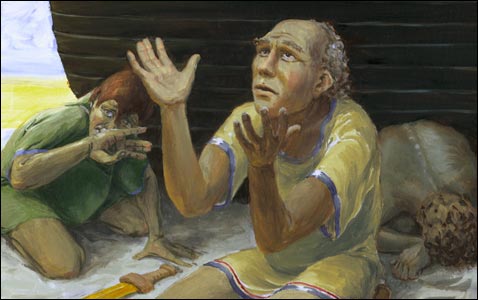|
Book Fifteen
|
|
|
|
At this point Zeus (zyoos) awakens from his slumber and sees Hector down, the Trojans on the run, and Poseidon (puh-SY-dun) wreaking havoc. He tells Hera (HEER-uh) that if she's responsible, she'll regret it as surely as the last time she tricked him into sleeping while she blew the ship of Heracles (HER-uh-kleez) off course. That time Zeus had tied anvils to her ankles and hung her suspended in midair, and any god who had thought to intervene had been hurled earthward from Olympus.
|
|
|
|
Hera feigns innocence and swears a solemn oath on a technicality — that Poseidon's intervention on behalf of the Greeks was not her idea. Zeus is completely taken in and quite pleased with his wife. "Excellent," he says. "Then we two stand united against Poseidon." He tells her to summon the messenger Iris and and the divine archer Apollo (uh-POL-oh). Iris will be dispatched to call off Poseidon, while Apollo will be instructed to breath new life into Hector and fire up the Trojans. This will cause Achilles (a-KIL-eez) to send his friend Patroclus (pa-TRAH-klus) into battle in his own place, and after winning great glory Patroclus will be cut down by Hector. Achilles will avenge his death and Troy will fall, all according to the plan of Athena (a-THEE-nuh), mistress of strategy.
|
|
|
|
Hera may have tricked her husband yet again, but she is sobered by the reminder of his fury when roused. Back on Olympus the mood is somber, as she counsels the other gods to bow to the will of Zeus. Yet she cannot resist provoking Ares (AIR-eez) into foolhardy rebellion by telling him that his son has just been killed by the Greeks. Impetuously donning his armor, Ares is about to descend on the Greeks when Athena yanks his spear away. She is not about to have Zeus turn his attention from the war to start battering Olympians, guilty and innocent alike.
|
|
|
|
Poseidon is similarly reluctant to knuckle under to his brother's supremacy when Iris seeks him out and orders him to withdraw from the fray. He protests that the three sons of Cronus (KROH-nus), king of the Titans, drew lots to divide up heaven and earth. Hades (HAY-deez) drew the underworld of the dead, Poseidon the sea, and Zeus the sky, but Olympus and the surface of the earth were to be held in common. Poseidon is prepared to fight for his rights, but Iris reminds him that Zeus is the older brother and the Furies always support the cause of older brothers. As if eager to have this excuse to relent, Poseidon says that he will cede to Zeus's instructions and ends with a rather hollow threat that if Zeus spares Troy he will open a rift between brothers that will never heal.
|
|
|
|
And now Apollo is entrusted with Zeus's tassled storm-shield, a magical creation of the craftsman god Hephaestus (heh-FEES-tus) guaranteed to strike fear into the hearts of men. Apollo reveals himself to Hector, who is immediately revived by the knowledge that he has the support of the gods. His return to battle demoralizes the Greeks, but it is the shield of Zeus and the war cry of Apollo that causes them to panic. Apollo himself leads the Trojan charge against the ships. He collapses the embankment of the trench and fills in a broad causeway, and he knocks the palisade down like a sand castle. With the battle now brought to the ships themselves, Nestor lets out a desperate prayer to Zeus that he not forget the abundant sacrifices in return for which he promised the Greeks a safe return to their homeland. Zeus responds with a great peal of thunder, which the Trojans take for a positive omen.
|
|
|
|
With the Trojans now in amongst the ships, Patroclus takes leave of his wounded friend and runs to implore Achilles to intervene. Hector, his eyes alight with battle fury, grabs onto the stern of a ship and calls for fire. Ajax is like some trick rider jumping from one horse's back to another as he ranges the decks of the beached ships, a huge pike in his hands. Twenty forearms long is the bronze-tipped shaft of this sailor's weapon. Lunging down with it from on high, Ajax chops the swarming Trojans right and left. Constantly shouting encouragement to his men, he reminds them that their backs are to the sea, with no troops in reserve, no citadel to withdraw to, their only salvation in their own fighting hands.
|
|
|
|
|
|
|

|



